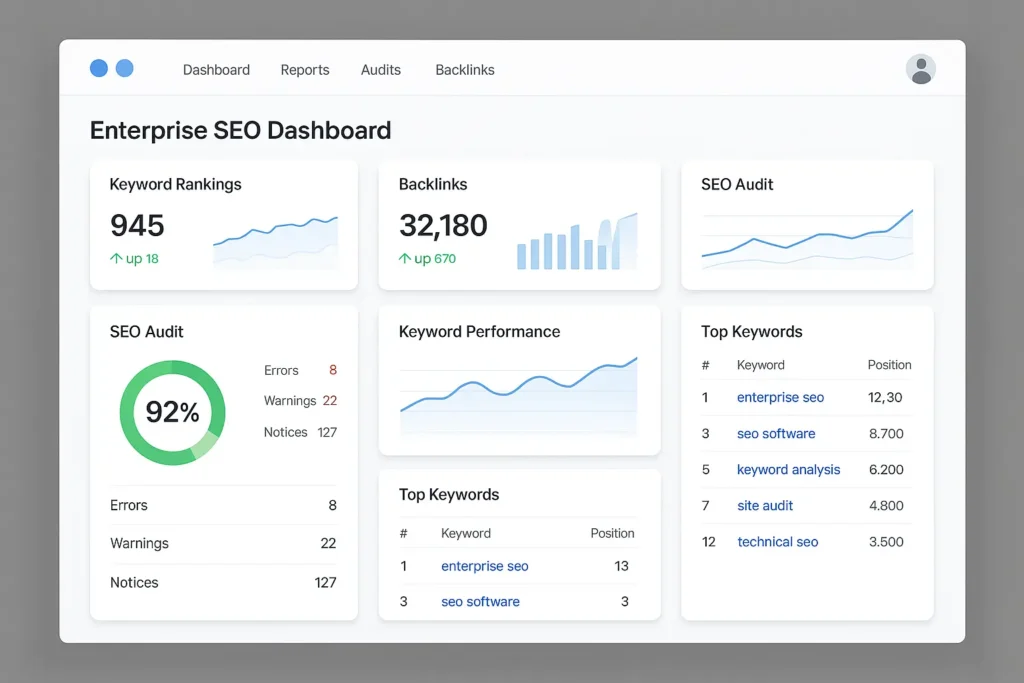Finding the right enterprise software for SEO can feel like searching for a needle in a digital haystack. With so many options promising to transform your search performance, how do you choose the perfect platform that actually delivers results at scale? The truth is, enterprise SEO demands specialized tools that go beyond basic keyword tracking or backlink analysis. You need robust systems that handle massive datasets, support cross-functional teams, and integrate with your existing tech stack.
In this guide, we’ll cut through the marketing hype and examine the true capabilities of the top enterprise-grade SEO platforms. Ready to find software that actually matches your organization’s specific needs? Let’s dive in!

Compare features of top 9 SEO tools
SEMrush: All-in-one for enterprise SEO
SEMrush stands out as a comprehensive solution that handles practically everything your enterprise SEO team needs. The Business plan’s Position Tracking tool monitors up to 5,000 keywords across multiple locations, and the Site Audit feature crawls up to 100,000 pages per audit (with a monthly limit of about 1 million pages). What really sets it apart? The API access that lets you pull data directly into custom dashboards, plus impressive competitor analysis features that reveal exactly what’s working in your industry.
Ahrefs: Scalable insights for big SEO teams
Ahrefs delivers unmatched backlink data that scales beautifully for enterprise teams. Its rank tracker can monitor up to 10,000 keywords across locations. The platform’s Keyword Explorer contains roughly 7.5 billion keywords, and its crawler visits over 8 billion web pages per day, ensuring fresh backlink data. The Content Explorer helps identify untapped opportunities across your market, while the rank tracker provides daily updates on your search positions. For content-focused enterprises, their content gap analysis tool is practically worth the subscription alone.
Conductor: Made for in-house SEO teams
Conductor focuses specifically on in-house enterprise teams with features built for cross-department collaboration. Their standout Workspace feature enables custom dashboards for different stakeholders – marketing execs see high-level KPIs while SEO specialists access granular data.
In 2025, Conductor’s platform adds advanced AI-driven features. Workspaces automatically distribute role-based reports and tie visibility, keyword performance, and competitor metrics to business outcomes. The Writing Assistant and AI Topic Map use generative AI to generate outlines and visualize topic clusters for content planning, while Intelligent Prioritization suggests high-impact optimization tasks across your entire site.
Moz Pro: Trusted by large organizations
Moz Pro brings user-friendly analytics to enterprise teams who need to share insights across technical and non-technical stakeholders. Their Page Optimization Score makes complex SEO concepts accessible to everyone. As of 2025, Moz Pro offers tiered plans ranging from the Starter plan ($49/month) with 1 tracked site and 50 keywords to the Large plan ($299/month) with 25 sites and 3,000 keywords. Monthly crawl allowances range from 20,000 pages to 5 million pages, depending on the plan. The platform shines with its campaign tracking features that integrate seamlessly with Google Analytics, allowing you to connect traffic patterns with actual conversions. For enterprises just scaling up their SEO efforts, Moz’s learning resources are invaluable for team training.
BrightEdge: AI-powered enterprise platform
BrightEdge leverages AI to automate countless SEO tasks that would otherwise consume your team’s valuable time. In 2025, BrightEdge’s Data Cube X provides real-time insights into AI-generated search results such as Google AI Overviews, helping brands understand their presence and identify content opportunities. The BrightEdge Copilot and Autopilot tools use generative AI to create and optimize content recommendations. The platform’s real strength lies in its predictive capabilities – forecasting traffic potential from content before you even publish it. For enterprises handling massive sites, BrightEdge’s content optimization engine identifies underperforming pages at scale.
SEOClarity: Enterprise-grade SEO automation
SEOClarity brings industrial-strength automation to enterprise SEO workflows. Their Content Fusion tool uses AI to analyze top-performing content and suggest improvements for your pages. Content Fusion now includes AI Overviews Analysis Mode, which analyzes topics appearing in Google’s AI-generated snippets, and an API that allows enterprises to generate reports and briefs at scale. The platform offers flexible user seats and keyword tracking to support large teams, and you can download detailed content briefs summarizing search intent, competitor content, word counts and more. What truly stands out is their real-time rank checking capability – no more waiting for scheduled updates when you need immediate data during critical campaigns.
Botify: Crawl budget and tech SEO master
Botify excels at solving the technical SEO challenges that plague large websites. The platform’s unique selling point is its crawl optimization capabilities, helping you maximize how search engines interact with your site structure. In 2025, Botify remains the go-to technical SEO engine for enterprises: its best-in-class log file analysis and crawl optimization tools scale to millions of URLs and prioritize high-value pages. The platform automates large-scale site audits, integrates with CDNs to improve crawl performance and still offers JavaScript rendering analysis for dynamic sites.
Serpstat: Budget-friendly enterprise option
Serpstat offers enterprise-level functionality without the typical enterprise price tag. Their clustering tool groups keywords by user intent, helping large content teams organize production more efficiently. According to Search Atlas’s 2025 review, Serpstat’s Team plan includes unlimited projects with 500 daily searches and allows you to audit 150,000 pages. The Agency plan scales to 5,000 daily searches and up to 1.5 million pages per audit. API access is also available in these tiers, giving larger teams automation options without paying premium prices. While it may lack some of the advanced features of pricier options, Serpstat delivers impressive value for enterprises watching their bottom line.
Siteimprove: SEO for compliance-driven sites
Siteimprove caters specifically to enterprises in highly regulated industries where compliance matters as much as rankings. Their platform uniquely combines SEO optimization with accessibility checking, ensuring your content performs well while meeting legal requirements.
In August 2025, Siteimprove launched Siteimprove.ai, an agentic content intelligence platform that unifies content compliance and performance on a single stack. The platform introduces dedicated Accessibility, Analytics, Search, Content, and Orchestration agents that proactively identify and resolve accessibility issues, predict and improve content ROI, optimize visibility across search engines and AI-powered discovery platforms, accelerate content research and drafting, and integrate with your CMS and tech stack. This agentic approach helps enterprises meet new regulations like the European Accessibility Act while scaling content outcomes across AI search and human users.
“In the AI era, enterprises are under tremendous pressure to meet compliance standards while ensuring their content performs — not just for people, but for AI,” – Nayaki Nayyar, CEO of Siteimprove.
Pick the right enterprise SEO software
Match SEO tools to your team setup
Consider your team structure before choosing any platform. Do you have dedicated SEO specialists or will marketing generalists be using the tool? Some platforms like Conductor excel at cross-team collaboration, while others like Ahrefs deliver deeper technical capabilities for specialized users. The best software aligns with how your team actually works – not how you wish they would work. Map out your current workflows first, then find software that enhances rather than disrupts them.
Compare custom reporting features
At enterprise scale, one-size-fits-all reports simply don’t cut it. Evaluate each platform’s ability to create custom dashboards for different stakeholders. Can you automatically generate reports for executives with high-level KPIs? Will SEO specialists get the granular data they need? Look for platforms with robust API access that let you pull specific data points into your existing business intelligence tools. The ability to customize reporting saves countless hours of manual data manipulation.
Check scalability across keywords and domains
Scalability matters more than almost anything else for enterprise SEO. Can the platform handle tracking thousands (or tens of thousands) of keywords? Does it impose limits on the number of domains you can monitor? Tools like SEMrush and BrightEdge offer practically unlimited scaling potential, while others may throttle performance as your tracking needs grow. Always ask potential vendors about their largest clients to gauge their true enterprise capabilities.
Review user control and access logs
Enterprise security requirements demand granular user permissions and comprehensive audit trails. Evaluate each platform’s ability to restrict access by role, department, or project. Can you see who made what changes when something goes wrong? Look for platforms with SAML/SSO integration to connect with your existing identity management systems. This seemingly minor feature becomes critical when you have dozens of users accessing sensitive competitive data.
Analyze technical SEO support ability
Large websites face unique technical challenges that basic SEO tools simply can’t handle. Assess each platform’s capabilities for crawl budget optimization, JavaScript rendering analysis, and handling of complex site architectures. Does the tool provide actionable recommendations for improving site structure? Can it identify critical technical issues before they impact rankings? Platforms like Botify and Deepcrawl specialize in these technical capabilities that enterprise sites desperately need.
Compare ROI using trial periods if allowed
Whenever possible, run a direct comparison using actual projects from your organization. Some enterprise vendors offer limited trials or proof-of-concept periods. Use these opportunities to test how each platform handles your specific challenges. Track the time saved through automation, the quality of insights generated, and the platform’s learning curve. Calculate potential ROI based on these real-world tests rather than trusting vendor promises or case studies from different industries.
Key considerations before making a choice
Know feature gaps between platforms
No single SEO platform does everything perfectly. Identify the specific capabilities most crucial to your strategy, then evaluate where each tool excels or falls short. Maybe you need superior content optimization but can sacrifice some backlink analysis depth. Perhaps technical SEO capabilities matter more than keyword research features. Create a weighted scorecard comparing critical features across your shortlisted platforms. This methodical approach prevents getting distracted by flashy features you’ll rarely use.
Keep integrations with martech in mind
Enterprise SEO doesn’t exist in isolation. Your chosen platform must play nicely with your existing marketing technology stack. Check for native integrations with your CMS, analytics platforms, and content marketing tools. Does the SEO software connect with your project management system? Can it push data to your business intelligence dashboard? The most powerful integrations automate workflows across tools, eliminating manual data transfers that consume valuable team time.
Understand pricing for multi-team access
Enterprise pricing models can get complicated fast. Some vendors charge by users, others by domains or keywords tracked. Watch for hidden costs like API access fees, onboarding charges, or limits on report generation. Request detailed quotes that account for your actual usage patterns and team size. Don’t hesitate to negotiate custom packages – enterprise vendors frequently customize pricing for large clients. Remember that the cheapest option often becomes expensive when you factor in lost productivity from inadequate tools.
Check availability of customer success teams
Enterprise implementations require more than just technical support. Evaluate the vendor’s customer success resources – do they provide dedicated account managers? Are there implementation specialists to help with onboarding? What about ongoing training for new team members? The best enterprise vendors view you as a partner, not just a client. They should offer strategic guidance on maximizing platform value, not just troubleshooting when things break. This partnership approach dramatically increases your likelihood of long-term success.
Choose SEO software fit for scale and depth
Selecting the right enterprise SEO software isn’t just about features or price – it’s about finding a platform that aligns with your organization’s specific workflow, technical needs, and growth trajectory. The best choice empowers your team to work smarter while delivering the depth of insights needed to drive meaningful organic growth.
Take time to thoroughly evaluate your options against your actual requirements rather than getting caught up in feature comparisons. Remember that implementation success depends as much on vendor partnership as on the technology itself. The right enterprise SEO platform becomes a competitive advantage that scales with your business, turning search visibility into sustainable revenue growth.
FAQ
What makes enterprise software for SEO different?
Enterprise SEO software handles massive scale – tracking thousands of keywords across multiple domains while supporting large teams with varied permissions. These platforms offer deeper technical analysis, more robust API access, and stronger security controls than standard SEO tools. They also typically provide dedicated account management and customized onboarding to support complex implementations.
Which are the best enterprise SEO platforms in 2025?
The top enterprise platforms for 2025 include SEMrush, Ahrefs, Conductor, BrightEdge, and SEOClarity. Each excels in different areas – SEMrush offers comprehensive all-in-one capabilities, Ahrefs delivers unmatched backlink data, Conductor focuses on in-house team collaboration, BrightEdge leverages AI for predictive insights, and SEOClarity provides industrial-strength automation.
What features should I prioritize in SEO software for large businesses?
Prioritize scalability (unlimited keywords/domains), team collaboration tools (role-based permissions), integration capabilities (API access), custom reporting, and technical SEO analysis. Large businesses should also look for platforms with dedicated account management, comprehensive training resources, and the ability to connect SEO metrics directly to business outcomes.
How do I compare top SEO tools for companies side by side?
Create a weighted scorecard evaluating each platform on your most critical needs. Consider scalability, ease of use, reporting capabilities, technical analysis depth, and integration options. Request demos using your actual data and involve stakeholders from different teams in the evaluation process. Calculate potential ROI based on time savings, improved insights, and implementation costs.
Can enterprise SEO software support multi-client management?
Yes, many enterprise platforms offer multi-client management features ideal for agencies or companies managing multiple brands. Look for tools with clear client separation, white-labeled reporting, and granular permission controls. Platforms like SEMrush, Ahrefs, and Serpstat offer specific agency features that support efficient management of diverse client portfolios while maintaining data security between accounts.

Ridam Khare is an SEO strategist with 7+ years of experience specializing in AI-driven content creation. He helps businesses scale high-quality blogs that rank, engage, and convert.



